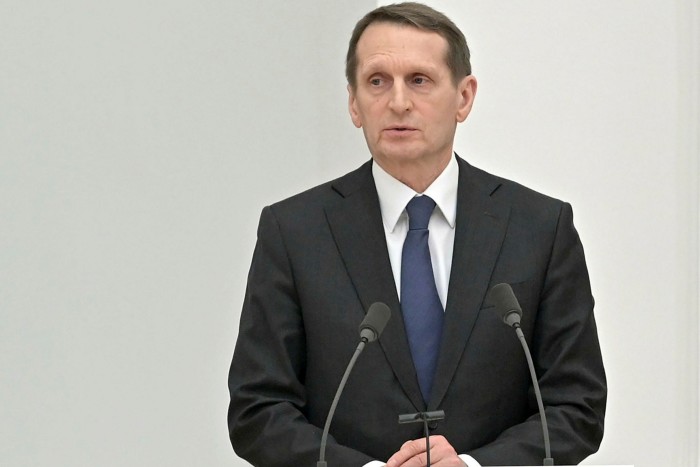For Vladimir Putin’s extraordinary meeting with his top security officials on Monday, he chose the Kremlin’s ornate Hall of the Order of St Catherine. Designed by the tsars to show off the glories of Russia’s empire, the setting perfectly underscored how much the president has come to resemble his autocratic forebears of old.
In a made-for-TV spectacle, Putin asked his subordinates one after the other to make the case for recognising two separatist-held territories in eastern Ukraine — a move that the west fears could mark the start of a war between Moscow and Kyiv, with as many as 190,000 Russian troops massed around Ukraine’s borders.
As he did so even his longest-serving allies looked terrified. Telling him what they evidently thought he wanted to hear, mostly repeating baseless claims from state television, they looked less like a sounding board than an imperial court.
“Are there any differing points of view?” Putin asked at one point. There were not.
In some ways, Monday’s session was the culmination of Putin’s 15-year grievances with the US and Nato, which he said were using Ukraine as a tool for “confrontation” with Moscow and ignoring Russia’s demands.
Nikolai Patrushev, the security council’s secretary, told him: “We don’t just need talks, we need to achieve concrete goals. They hide their concrete goal, which is to destroy the Russian Federation.”
But it also marked what could be a defining moment in Putin’s 22-year rule.
Holding the meeting in the room where he annexed Crimea in 2014 underscored how much more autocratic Russia has become in eight years of the eastern Ukraine conflict. Then, Putin stayed up until 7am with four of his top security officials hatching a plan to seize the peninsula.
Today, the extensive efforts Putin takes to avoid catching the coronavirus have deepened his already substantial isolation. He holds most of his meetings in public, forces most visitors to quarantine for two weeks, and attended a Christmas service in a chapel empty save for the priests.
During his few in-person meetings, armchair Kremlinologists have turned to Putin’s idiosyncratic furniture choices for clues into his state of mind.
France’s Emmanuel Macron and Germany’s Olaf Scholz, who refused to take a Kremlin-administered PCR test, were seated at the other end of a comically huge table. Allies such as Alexander Lukashenko, meanwhile, sat around a tiny table, with the bulky leader of Belarus squeezed into a chair that could barely hold him.
This time the two dozen or so members of the security council were at the other end of the hall as Putin slouched in a table at least 20 feet away from them. Even the most powerful state officials were made to look like schoolchildren reporting to the headteacher as Putin asked them for their views on recognising the separatists.
Dmitry Medvedev, who once represented dashed hopes for a more liberal Russia when he filled Putin’s role as president, told him that “the scale of potential conflict can be compared with what we faced in 2008” during the war with Georgia.
“But now we know what is going to happen,” he said. “We know how to withstand this pressure.”

At one point, Sergei Naryshkin, the powerful foreign intelligence chief, suggested using the threat of recognition as a tool to compel Ukraine to conclude peace on Moscow’s terms. Putin then told him: “Are you proposing starting the negotiation process, or recognise the republics’ sovereignty? Speak clearly!”
Naryshkin began to stutter. “I will support the decision to recognise — ”
Putin cut him off. “I will support or I support? Speak clearly, Sergei!”
A visibly flustered Naryshkin mumbled that he supported incorporating the separatist territories into Russia.
“That’s not what we’re discussing!” Putin said. “We’re talking about whether to recognise their independence or not.”
Naryshkin meekly assented.
Putin insisted he had not discussed the topic with any of the officials beforehand. But the heavily stage-managed nature of the event made that hard to believe — viewers spotted some speeches were cut and defence minister Sergei Shoigu’s watch showed a time five hours earlier, adding to suspicions the video was pre-recorded.
Mikhail Mishustin, prime minister, admitted the cabinet had “been preparing for the potential reaction to our recognition [of the separatists] for several months now . . . the risks have been quite well worked out.”
Putin’s decision will only be the beginning of a long and fraught process. Vladimir Kolokoltsev, interior minister, urged him to recognise the separatists in their “historical borders”, much of which is still controlled by Ukraine. Doing so would guarantee all-out war.
“A decision will be taken today,” Putin said. The TV feed abruptly cut off — as if to underscore that the decision will be Putin’s, and Putin’s alone.

